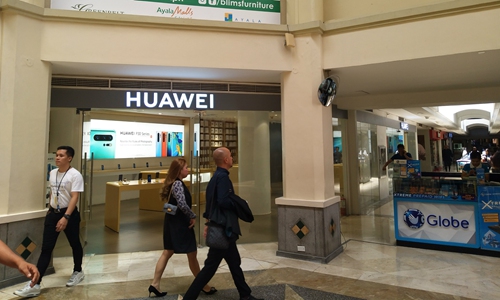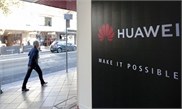SOURCE / INDUSTRIES
Mixed signals from France on Huawei spark concern
Swaying decision may further delay country’s pace in 5G layout, lead to rising cost: analyst

A Huawei store stands next to a Globe Telecom booth in Makati City, the Philippines on April 14, 2019. Photo: cnsphoto
France's reported "hidden" ban on Huawei will not only delay 5G commercialization in the country that could have taken the lead in utilizing next-generation technology, but will increase uncertainties for local telecom operators, which are now struggling amid a severe economic downturn, analysts said.
French authorities have told telecom operators planning to buy Huawei 5G equipment that they won't be able to renew licenses for the gear once they expire in 2028, effectively phasing the Chinese firm out of mobile networks, Reuters said.
Wang Wenbin, spokesperson for China's Foreign Ministry, told a regular press conference Thursday that China hopes and believes that "France can keep its promises, eliminate interference, and take practical actions to provide an open, fair and non-discriminatory business environment for Chinese companies investing in France, including Huawei", to effectively safeguard the sound development momentum of China-France economic and trade relations.
The reported move is a reverse from its attitude days before - when the head of the French cyber-security agency ANSSI said there would not be a total ban on using equipment from Huawei in the rollout of the French 5G network, but that it was pushing French telcos to avoid switching to the Chinese company.
According the Reuters report, the sources said ANSSI had informed operators of most licensing decisions for large cities. They said the bulk of authorizations for Huawei gear were for three or five years, while most of those for equipment from European rivals Ericsson or Nokia received eight-year licenses.
The policy could force local telecom operators to abandon Huawei given the shortened license time-frame, analysts said.
Huawei did not comment as of press time on Thursday.
"France, Germany and the UK took the lead in 5G in Europe, but the reported move will of course delay its 5G layout and commercialization, since local telecom operators will have to repurchase and replace the 5G equipment from Huawei," Jiang Junmu, an industry analyst and a close follower of Huawei, told the Global Times Wednesday.
Moreover, analysts warned that operators who already used Huawei tech could face the extra cost of replacing the Chinese telecom provider's equipment, for instance, Bouygues Telecom and Altice Europe's SFR.
Two other two major operators in France - Orange and Iliad - mainly rely on Nokia and Ericsson, but their products are more expensive than Huawei's.
Nevertheless, issues of cost are outweighed, as Huawei has become more of a political symbol than a simple business problem, analysts said.
The US government is using Huawei as a political symbol and sending a signal to its allies that "if you support Huawei, you are supporting China." Therefore, France may change course given the current state of China-US relations, said Jiang.
The move also reflects the ambivalence of European countries including France - they are hoping to use Huawei to reduce technological reliance on the US, while cannot revolt "too much" under the US' intensified pressure, and the domestic attitude toward China is becoming more divided given a series of issues recently, Wang Yiwei, director of the International Affairs Institute at the Renmin University of China, told the Global Times Wednesday.
Huawei's fate has been uncertain in Europe - UK Prime Minister Boris Johnson has ordered Huawei equipment to be purged completely from Britain's 5G network by 2027, while media reports said the country has been reconsidering the decision.
Germany has said it will not ban the Chinese firm from its 5G construction.
The EU may not have a set tone on Huawei until the US presidential election in November, Cui Hongjian, director of EU Studies at the China Institute of International Studies, told the Global Times Thursday.
In a post on Twitter Wednesday about digital inclusion and sustainability, Huawei Europe said: "The US and China currently create the vast majority of wealth in the digital economy, while Europe struggles to catch up." The post said that Huawei is aiming to bridge the digital divide.

